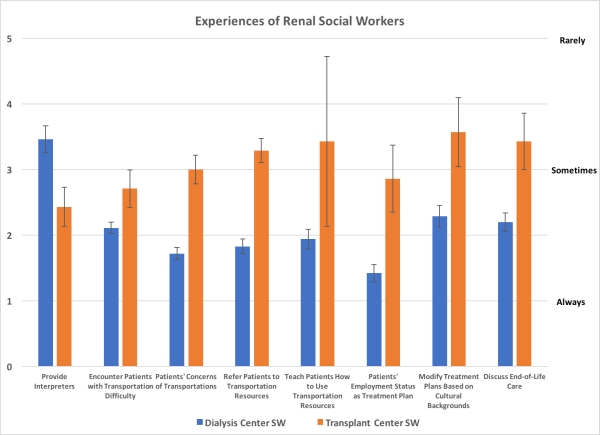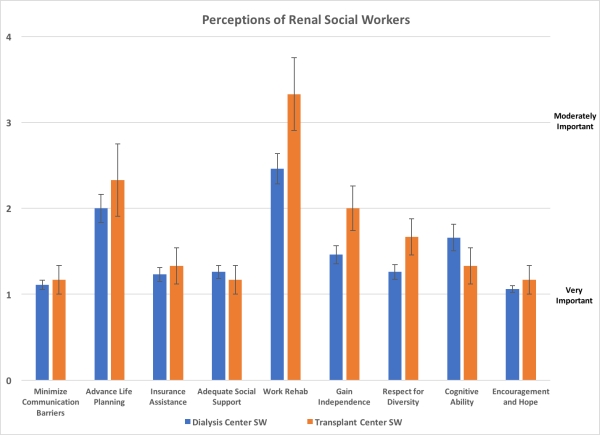Potential Barriers to Renal Patient Care: Perspectives of Dialysis and Transplant Social Workers
D. Lim,1 A. Patel,2 N. Khoury,2 R. Prashar.2
1Wayne State University School of Medicine, Detroit, MI
2Department of Nephrology and Transplant Institute, Henry Ford Hospital, Detroit, MI.
Meeting: 2018 American Transplant Congress
Abstract number: B199
Keywords: Outcome, Psychosocial
Session Information
Session Name: Poster Session B: Kidney Psychosocial
Session Type: Poster Session
Date: Sunday, June 3, 2018
Session Time: 6:00pm-7:00pm
 Presentation Time: 6:00pm-7:00pm
Presentation Time: 6:00pm-7:00pm
Location: Hall 4EF
Background: Little is studied about social workers' (SW) perceptions and experiences in dialysis and transplant care. We aimed to assess patient care experiences and perspectives of SW in dialysis and transplant settings.
Methods: In our survey, six care barriers were identified: communication (reading, verbal), advance care planning, psychosocial (transportation, vocation, insurance), independence, support system, and cognitive status. Surveys were sent to dialysis (DSW) and transplant (TSW) SW in Michigan to inquire about barriers perceived. Results were quantified with a 1~5 scale (1 = most likely). Weighted average and standard error were calculated, and barriers with significant differences (difference of avg. ≥ 1) were reported.
Results: 37 DSW and 7 TSW responded to our survey. DSW frequently noted transportation difficulties and concerns, considered patients' employment status in care plans (psychosocial), modified treatment based on cultural/religious background (support system), and discussed advance care planning; DSW perceived resolving psychosocial barriers (mobility) and support system as vital for treatment success. However, TSW emphasized “adequate social support” as assistance with medication and compliance, early hands-on help, and caregiver education for post-transplant care. In contrast, DSW deemed “adequate social support” in general terms.  Both DSW and TSW experienced literacy, insurance, and cognitive status barriers. They both perceived overcoming most barriers and ensuring patients' cognitive ability as important for treatment success.
Both DSW and TSW experienced literacy, insurance, and cognitive status barriers. They both perceived overcoming most barriers and ensuring patients' cognitive ability as important for treatment success. 
Conclusions: Common goals of care plan among DSW and TSW would be beneficial to aid patients transitioning between the two settings and improving overall treatment outcome.
CITATION INFORMATION: Lim D., Patel A., Khoury N., Prashar R. Potential Barriers to Renal Patient Care: Perspectives of Dialysis and Transplant Social Workers Am J Transplant. 2017;17 (suppl 3).
To cite this abstract in AMA style:
Lim D, Patel A, Khoury N, Prashar R. Potential Barriers to Renal Patient Care: Perspectives of Dialysis and Transplant Social Workers [abstract]. https://atcmeetingabstracts.com/abstract/potential-barriers-to-renal-patient-care-perspectives-of-dialysis-and-transplant-social-workers/. Accessed February 19, 2026.« Back to 2018 American Transplant Congress
